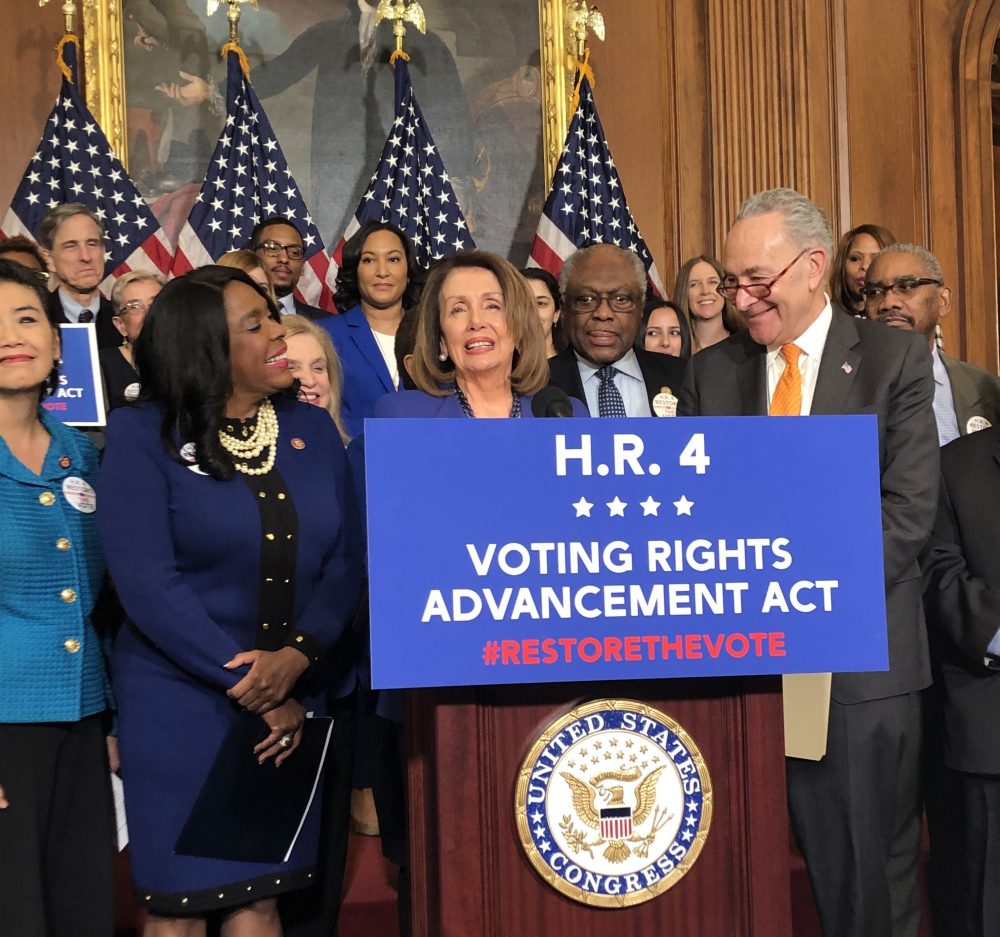WASHINGTON — On the eve of the 54th anniversary of the Selma to Montgomery marches for civil rights, House Democrats introduced a bill Tuesday aimed at returning to the federal government the authority to protect voting rights in states with histories of discriminatory practices.
The measure is a response to a 2013 Supreme Court decision that gutted a key provision of the Voting Rights Act of 1965, which outlawed discriminatory practices in voter registration adopted by states after the Civil War.
The 2013 Supreme Court case, Shelby County v. Holder, struck down as unconstitutional Section 4(b) of the Voting Rights Act, which had originally held particular jurisdictions to federal preclearance of voting procedures due to their prior history of discrimination.
“The Shelby County decision was wrong, we are right,” Sen. Patrick Leahy, D-Vermont, said at a Capitol Hill press conference. “I look at others in states where they create — sometimes not even creatively — obscene ways to stop people from voting.”
Rep. Terri Sewell, D-Alabama, the lead sponsor of the bill, said that the court’s decision called for a “modern-day formula” to the Voting Rights Act. She highlighted the 2018 Georgia gubernatorial election, in which hundreds of thousands of voter registrations were canceled in the months leading up to the election, as an example of how states are suppressing citizens’ ability to vote.
“It’s been pretty easy to see what state legislatures are doing across this country without the full protections of the Voting Rights Act,” Sewell said. “They have been suppressing the right to vote in the name of ‘voter fraud.’ In the name of ‘not having enough resources,’ they have been closing down polling locations.”
Sewell was among multiple supporters of the bill who pointed to the case of potential voter fraud that took place in North Carolina during the 2018 election cycle, when the state legislature closed nearly 20 percent of early voting locations.
“(Justice) Ruth Bader Ginsberg in the Shelby v. Holder case said that the majority’s opinion was like having an umbrella, and because they weren’t getting wet, they took it down,” House Majority Leader Steny Hoyer, D-Mechanicsville, said. “And then a whole lot of folks got wet, real quick. They got rained upon by the exclusionary actions in North Carolina, in Texas, in other states.”
With minority voter turnout at the focal point of the bill, leaders from the Congressional Black Caucus, Asian Pacific American Caucus and Hispanic Caucus were on hand to show support.
“Asian-Americans have had voter disenfranchisement tactics instilled upon them, discriminatory voter ID laws, voter intimidation and efforts to refuse language assistance at the polls,” explained Rep. Judy Chu, D-California, who is chairwoman of the Asian Pacific American Caucus. “This has resulted in some [Asian-American Pacific Islanders] being unable to vote because they could not read the ballot.”
While the legislation is expected to pass the House, which is controlled by the Democrats, the voter reform bill’s future in the GOP-run Senate is far more murky.
Video by Maryam Shahzad & Julia Kim
On Tuesday, Senate Majority Leader Mitch McConnell, R-Kentucky, blamed Democrats for the election fraud that took place in North Carolina’s 9th Congressional District.
McConnell’s comments come just days after the state’s election board unanimously ordered a new election in the district after finding evidence that Republican Mark Harris reportedly hired people to collect absentee ballots. Democrats, McConnell claimed, are the ones who have dragged their feet on voter reform.
And in January, McConnell took issue with the voting reform outlined in the For the People Act — House Democrats’ first reform bill of the new Congressional session — finding fault in the legislation’s call to designate Election Day as a federal holiday. He called the measure a “power grab” by Democrats.
Despite pushback from McConnell, House Judiciary Committee Chairman Jerry Nadler, D-New York, expressed his hopes that the bill garners support by both parties in Congress.
“The vitality of the Voting Rights (Advancement) Act should be a major bipartisan objective by this Congress,” Nadler said. “This bill should pass unanimously. It won’t, but it should.”

